Tax Law Assignment: Compensation, Reimbursement, and Tax Implications
VerifiedAdded on 2022/12/26
|7
|1608
|95
Homework Assignment
AI Summary
This tax law assignment analyzes the taxation consequences for Our Earth Pty Ltd, an Australian company, concerning compensation received from a competitor, Coffee Bean Pty Ltd, for design patent infringement, lost revenue, and interest on damages. The assignment examines whether the payments constitute capital gains or ordinary income based on relevant case law and the Income Tax Assessment Act 1997 (ITAA97). The analysis considers a $300,000 payment for design patent infringement (capital gain), $200,000 for lost revenue (ordinary income), $15,000 interest on the damages payout (ordinary income), and $40,000 reimbursement of legal fees (capital gain). The student applies legal principles to determine the correct tax treatment of each component, referencing cases like McLaurin v FC of T, Californian Oil Products Limited (In Liquidation) v Federal Commissioner of Taxation, and Federal Wharf Co Ltd v DFC of T. The conclusion summarizes the tax treatment of each payment type.
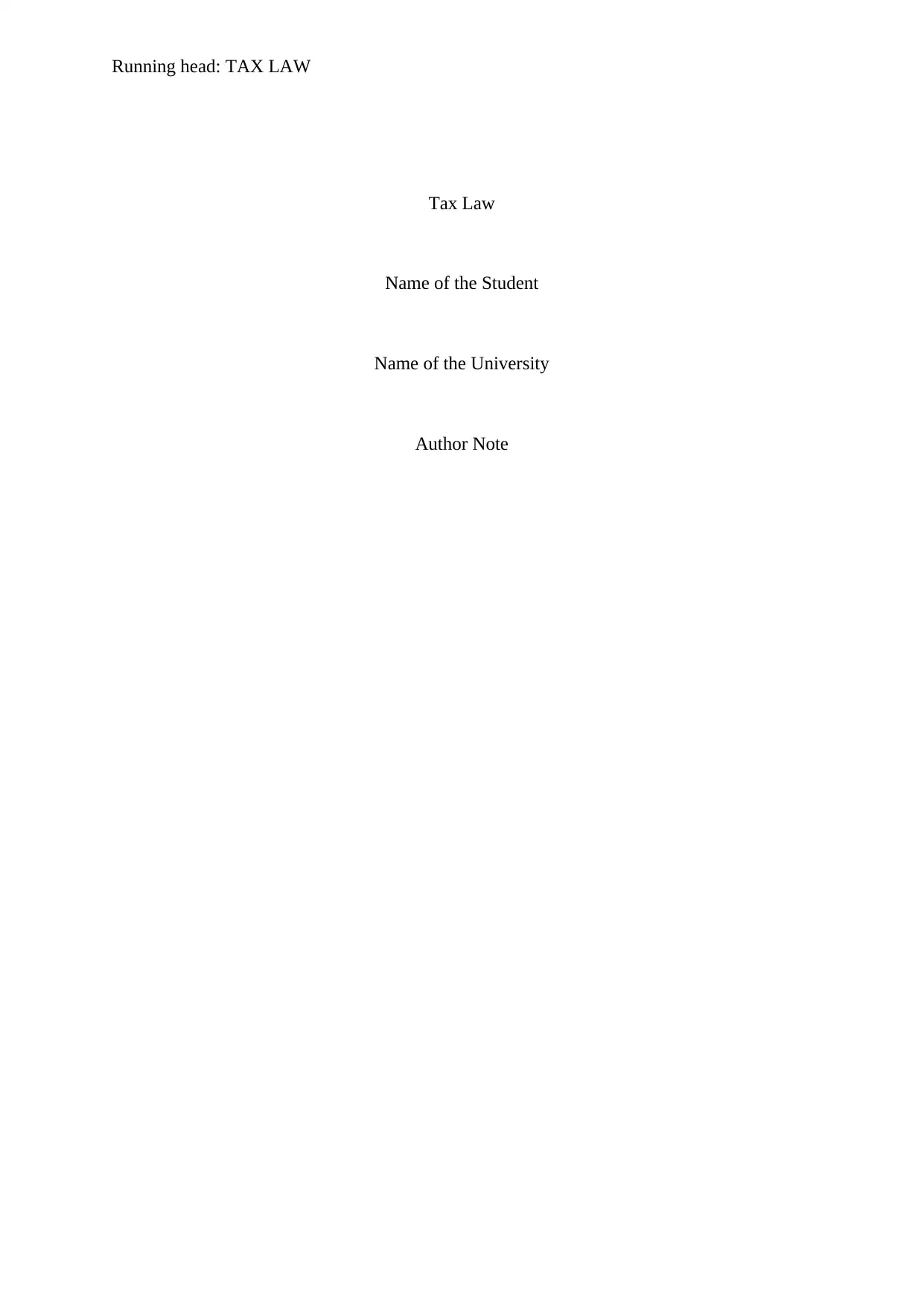
Running head: TAX LAW
Tax Law
Name of the Student
Name of the University
Author Note
Tax Law
Name of the Student
Name of the University
Author Note
Paraphrase This Document
Need a fresh take? Get an instant paraphrase of this document with our AI Paraphraser
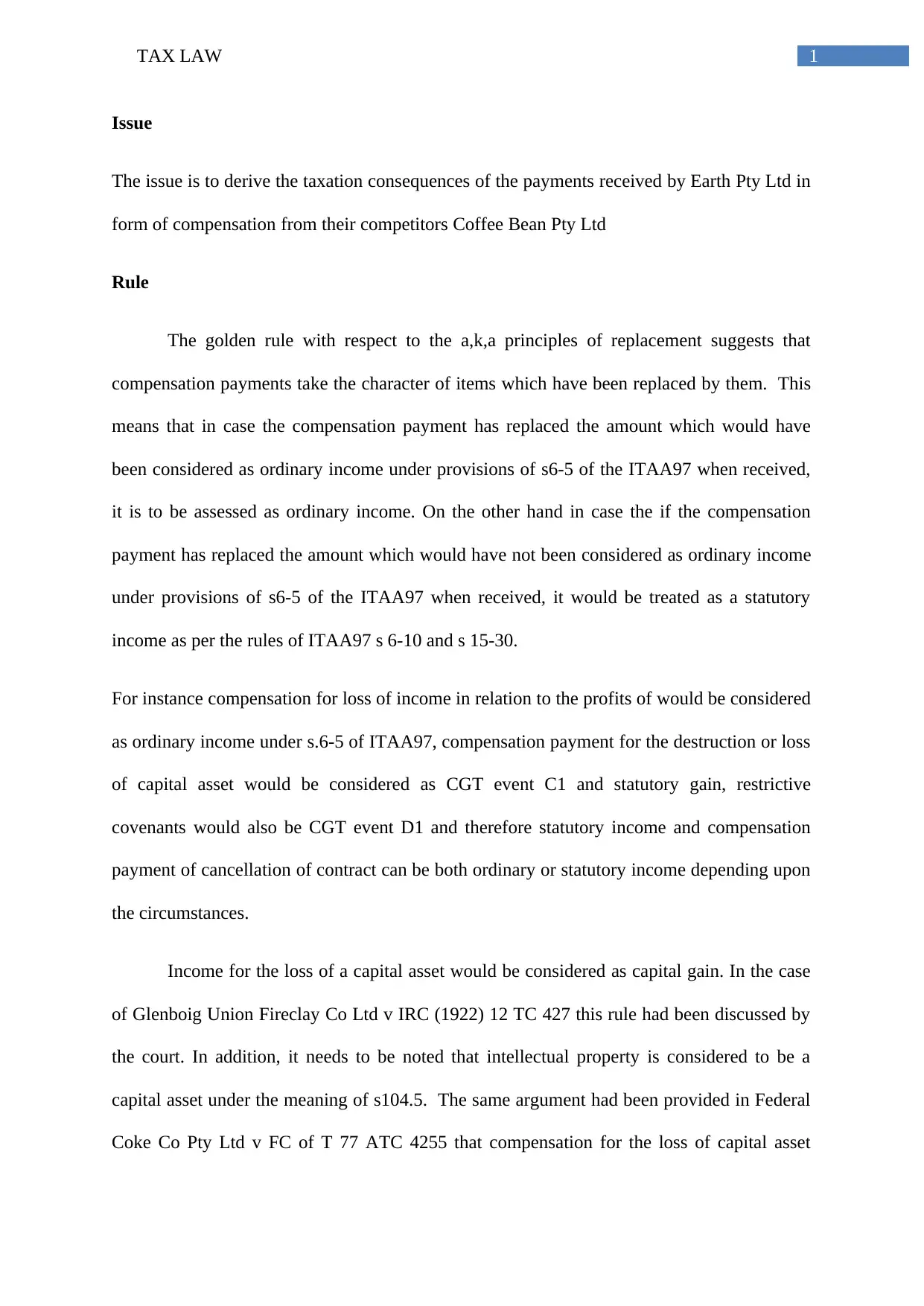
1TAX LAW
Issue
The issue is to derive the taxation consequences of the payments received by Earth Pty Ltd in
form of compensation from their competitors Coffee Bean Pty Ltd
Rule
The golden rule with respect to the a,k,a principles of replacement suggests that
compensation payments take the character of items which have been replaced by them. This
means that in case the compensation payment has replaced the amount which would have
been considered as ordinary income under provisions of s6-5 of the ITAA97 when received,
it is to be assessed as ordinary income. On the other hand in case the if the compensation
payment has replaced the amount which would have not been considered as ordinary income
under provisions of s6-5 of the ITAA97 when received, it would be treated as a statutory
income as per the rules of ITAA97 s 6-10 and s 15-30.
For instance compensation for loss of income in relation to the profits of would be considered
as ordinary income under s.6-5 of ITAA97, compensation payment for the destruction or loss
of capital asset would be considered as CGT event C1 and statutory gain, restrictive
covenants would also be CGT event D1 and therefore statutory income and compensation
payment of cancellation of contract can be both ordinary or statutory income depending upon
the circumstances.
Income for the loss of a capital asset would be considered as capital gain. In the case
of Glenboig Union Fireclay Co Ltd v IRC (1922) 12 TC 427 this rule had been discussed by
the court. In addition, it needs to be noted that intellectual property is considered to be a
capital asset under the meaning of s104.5. The same argument had been provided in Federal
Coke Co Pty Ltd v FC of T 77 ATC 4255 that compensation for the loss of capital asset
Issue
The issue is to derive the taxation consequences of the payments received by Earth Pty Ltd in
form of compensation from their competitors Coffee Bean Pty Ltd
Rule
The golden rule with respect to the a,k,a principles of replacement suggests that
compensation payments take the character of items which have been replaced by them. This
means that in case the compensation payment has replaced the amount which would have
been considered as ordinary income under provisions of s6-5 of the ITAA97 when received,
it is to be assessed as ordinary income. On the other hand in case the if the compensation
payment has replaced the amount which would have not been considered as ordinary income
under provisions of s6-5 of the ITAA97 when received, it would be treated as a statutory
income as per the rules of ITAA97 s 6-10 and s 15-30.
For instance compensation for loss of income in relation to the profits of would be considered
as ordinary income under s.6-5 of ITAA97, compensation payment for the destruction or loss
of capital asset would be considered as CGT event C1 and statutory gain, restrictive
covenants would also be CGT event D1 and therefore statutory income and compensation
payment of cancellation of contract can be both ordinary or statutory income depending upon
the circumstances.
Income for the loss of a capital asset would be considered as capital gain. In the case
of Glenboig Union Fireclay Co Ltd v IRC (1922) 12 TC 427 this rule had been discussed by
the court. In addition, it needs to be noted that intellectual property is considered to be a
capital asset under the meaning of s104.5. The same argument had been provided in Federal
Coke Co Pty Ltd v FC of T 77 ATC 4255 that compensation for the loss of capital asset
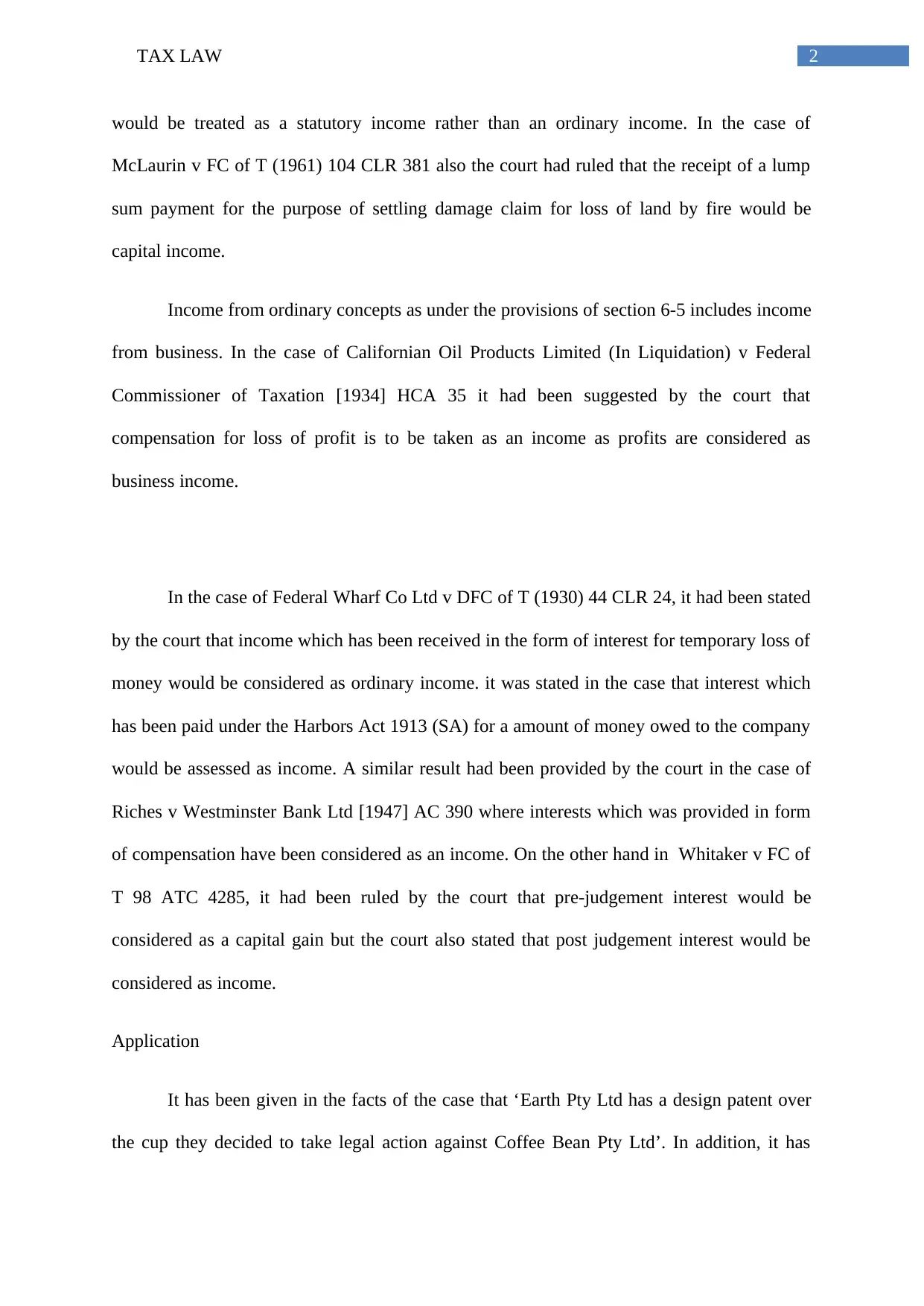
2TAX LAW
would be treated as a statutory income rather than an ordinary income. In the case of
McLaurin v FC of T (1961) 104 CLR 381 also the court had ruled that the receipt of a lump
sum payment for the purpose of settling damage claim for loss of land by fire would be
capital income.
Income from ordinary concepts as under the provisions of section 6-5 includes income
from business. In the case of Californian Oil Products Limited (In Liquidation) v Federal
Commissioner of Taxation [1934] HCA 35 it had been suggested by the court that
compensation for loss of profit is to be taken as an income as profits are considered as
business income.
In the case of Federal Wharf Co Ltd v DFC of T (1930) 44 CLR 24, it had been stated
by the court that income which has been received in the form of interest for temporary loss of
money would be considered as ordinary income. it was stated in the case that interest which
has been paid under the Harbors Act 1913 (SA) for a amount of money owed to the company
would be assessed as income. A similar result had been provided by the court in the case of
Riches v Westminster Bank Ltd [1947] AC 390 where interests which was provided in form
of compensation have been considered as an income. On the other hand in Whitaker v FC of
T 98 ATC 4285, it had been ruled by the court that pre-judgement interest would be
considered as a capital gain but the court also stated that post judgement interest would be
considered as income.
Application
It has been given in the facts of the case that ‘Earth Pty Ltd has a design patent over
the cup they decided to take legal action against Coffee Bean Pty Ltd’. In addition, it has
would be treated as a statutory income rather than an ordinary income. In the case of
McLaurin v FC of T (1961) 104 CLR 381 also the court had ruled that the receipt of a lump
sum payment for the purpose of settling damage claim for loss of land by fire would be
capital income.
Income from ordinary concepts as under the provisions of section 6-5 includes income
from business. In the case of Californian Oil Products Limited (In Liquidation) v Federal
Commissioner of Taxation [1934] HCA 35 it had been suggested by the court that
compensation for loss of profit is to be taken as an income as profits are considered as
business income.
In the case of Federal Wharf Co Ltd v DFC of T (1930) 44 CLR 24, it had been stated
by the court that income which has been received in the form of interest for temporary loss of
money would be considered as ordinary income. it was stated in the case that interest which
has been paid under the Harbors Act 1913 (SA) for a amount of money owed to the company
would be assessed as income. A similar result had been provided by the court in the case of
Riches v Westminster Bank Ltd [1947] AC 390 where interests which was provided in form
of compensation have been considered as an income. On the other hand in Whitaker v FC of
T 98 ATC 4285, it had been ruled by the court that pre-judgement interest would be
considered as a capital gain but the court also stated that post judgement interest would be
considered as income.
Application
It has been given in the facts of the case that ‘Earth Pty Ltd has a design patent over
the cup they decided to take legal action against Coffee Bean Pty Ltd’. In addition, it has
⊘ This is a preview!⊘
Do you want full access?
Subscribe today to unlock all pages.

Trusted by 1+ million students worldwide
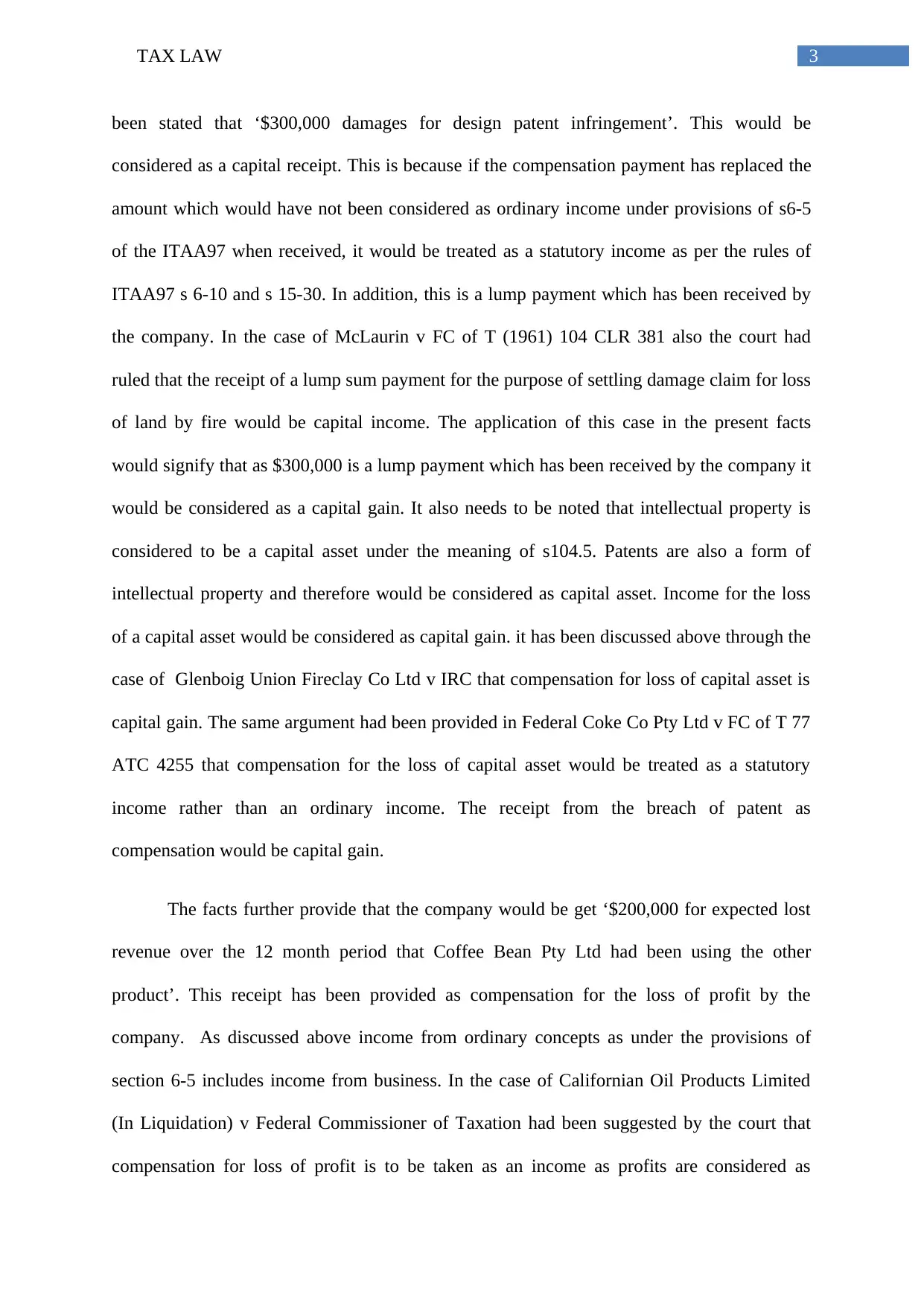
3TAX LAW
been stated that ‘$300,000 damages for design patent infringement’. This would be
considered as a capital receipt. This is because if the compensation payment has replaced the
amount which would have not been considered as ordinary income under provisions of s6-5
of the ITAA97 when received, it would be treated as a statutory income as per the rules of
ITAA97 s 6-10 and s 15-30. In addition, this is a lump payment which has been received by
the company. In the case of McLaurin v FC of T (1961) 104 CLR 381 also the court had
ruled that the receipt of a lump sum payment for the purpose of settling damage claim for loss
of land by fire would be capital income. The application of this case in the present facts
would signify that as $300,000 is a lump payment which has been received by the company it
would be considered as a capital gain. It also needs to be noted that intellectual property is
considered to be a capital asset under the meaning of s104.5. Patents are also a form of
intellectual property and therefore would be considered as capital asset. Income for the loss
of a capital asset would be considered as capital gain. it has been discussed above through the
case of Glenboig Union Fireclay Co Ltd v IRC that compensation for loss of capital asset is
capital gain. The same argument had been provided in Federal Coke Co Pty Ltd v FC of T 77
ATC 4255 that compensation for the loss of capital asset would be treated as a statutory
income rather than an ordinary income. The receipt from the breach of patent as
compensation would be capital gain.
The facts further provide that the company would be get ‘$200,000 for expected lost
revenue over the 12 month period that Coffee Bean Pty Ltd had been using the other
product’. This receipt has been provided as compensation for the loss of profit by the
company. As discussed above income from ordinary concepts as under the provisions of
section 6-5 includes income from business. In the case of Californian Oil Products Limited
(In Liquidation) v Federal Commissioner of Taxation had been suggested by the court that
compensation for loss of profit is to be taken as an income as profits are considered as
been stated that ‘$300,000 damages for design patent infringement’. This would be
considered as a capital receipt. This is because if the compensation payment has replaced the
amount which would have not been considered as ordinary income under provisions of s6-5
of the ITAA97 when received, it would be treated as a statutory income as per the rules of
ITAA97 s 6-10 and s 15-30. In addition, this is a lump payment which has been received by
the company. In the case of McLaurin v FC of T (1961) 104 CLR 381 also the court had
ruled that the receipt of a lump sum payment for the purpose of settling damage claim for loss
of land by fire would be capital income. The application of this case in the present facts
would signify that as $300,000 is a lump payment which has been received by the company it
would be considered as a capital gain. It also needs to be noted that intellectual property is
considered to be a capital asset under the meaning of s104.5. Patents are also a form of
intellectual property and therefore would be considered as capital asset. Income for the loss
of a capital asset would be considered as capital gain. it has been discussed above through the
case of Glenboig Union Fireclay Co Ltd v IRC that compensation for loss of capital asset is
capital gain. The same argument had been provided in Federal Coke Co Pty Ltd v FC of T 77
ATC 4255 that compensation for the loss of capital asset would be treated as a statutory
income rather than an ordinary income. The receipt from the breach of patent as
compensation would be capital gain.
The facts further provide that the company would be get ‘$200,000 for expected lost
revenue over the 12 month period that Coffee Bean Pty Ltd had been using the other
product’. This receipt has been provided as compensation for the loss of profit by the
company. As discussed above income from ordinary concepts as under the provisions of
section 6-5 includes income from business. In the case of Californian Oil Products Limited
(In Liquidation) v Federal Commissioner of Taxation had been suggested by the court that
compensation for loss of profit is to be taken as an income as profits are considered as
Paraphrase This Document
Need a fresh take? Get an instant paraphrase of this document with our AI Paraphraser
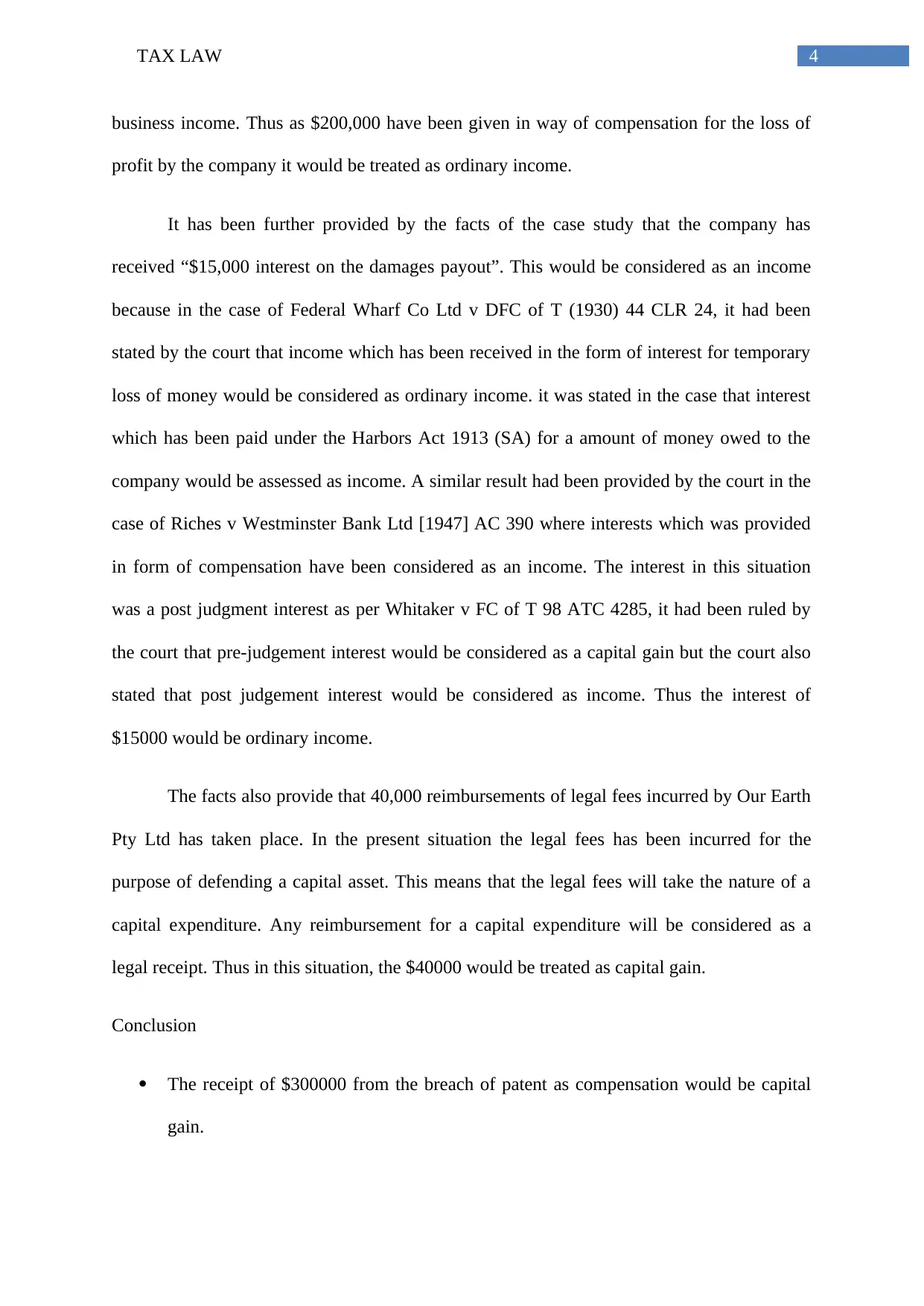
4TAX LAW
business income. Thus as $200,000 have been given in way of compensation for the loss of
profit by the company it would be treated as ordinary income.
It has been further provided by the facts of the case study that the company has
received “$15,000 interest on the damages payout”. This would be considered as an income
because in the case of Federal Wharf Co Ltd v DFC of T (1930) 44 CLR 24, it had been
stated by the court that income which has been received in the form of interest for temporary
loss of money would be considered as ordinary income. it was stated in the case that interest
which has been paid under the Harbors Act 1913 (SA) for a amount of money owed to the
company would be assessed as income. A similar result had been provided by the court in the
case of Riches v Westminster Bank Ltd [1947] AC 390 where interests which was provided
in form of compensation have been considered as an income. The interest in this situation
was a post judgment interest as per Whitaker v FC of T 98 ATC 4285, it had been ruled by
the court that pre-judgement interest would be considered as a capital gain but the court also
stated that post judgement interest would be considered as income. Thus the interest of
$15000 would be ordinary income.
The facts also provide that 40,000 reimbursements of legal fees incurred by Our Earth
Pty Ltd has taken place. In the present situation the legal fees has been incurred for the
purpose of defending a capital asset. This means that the legal fees will take the nature of a
capital expenditure. Any reimbursement for a capital expenditure will be considered as a
legal receipt. Thus in this situation, the $40000 would be treated as capital gain.
Conclusion
The receipt of $300000 from the breach of patent as compensation would be capital
gain.
business income. Thus as $200,000 have been given in way of compensation for the loss of
profit by the company it would be treated as ordinary income.
It has been further provided by the facts of the case study that the company has
received “$15,000 interest on the damages payout”. This would be considered as an income
because in the case of Federal Wharf Co Ltd v DFC of T (1930) 44 CLR 24, it had been
stated by the court that income which has been received in the form of interest for temporary
loss of money would be considered as ordinary income. it was stated in the case that interest
which has been paid under the Harbors Act 1913 (SA) for a amount of money owed to the
company would be assessed as income. A similar result had been provided by the court in the
case of Riches v Westminster Bank Ltd [1947] AC 390 where interests which was provided
in form of compensation have been considered as an income. The interest in this situation
was a post judgment interest as per Whitaker v FC of T 98 ATC 4285, it had been ruled by
the court that pre-judgement interest would be considered as a capital gain but the court also
stated that post judgement interest would be considered as income. Thus the interest of
$15000 would be ordinary income.
The facts also provide that 40,000 reimbursements of legal fees incurred by Our Earth
Pty Ltd has taken place. In the present situation the legal fees has been incurred for the
purpose of defending a capital asset. This means that the legal fees will take the nature of a
capital expenditure. Any reimbursement for a capital expenditure will be considered as a
legal receipt. Thus in this situation, the $40000 would be treated as capital gain.
Conclusion
The receipt of $300000 from the breach of patent as compensation would be capital
gain.

5TAX LAW
As $200,000 have been given in way of compensation for the loss of profit by the
company it would be treated as ordinary income.
The interest of $15000 would be ordinary income.
In this situation, the $40000 would be treated as capital gain.
As $200,000 have been given in way of compensation for the loss of profit by the
company it would be treated as ordinary income.
The interest of $15000 would be ordinary income.
In this situation, the $40000 would be treated as capital gain.
⊘ This is a preview!⊘
Do you want full access?
Subscribe today to unlock all pages.

Trusted by 1+ million students worldwide
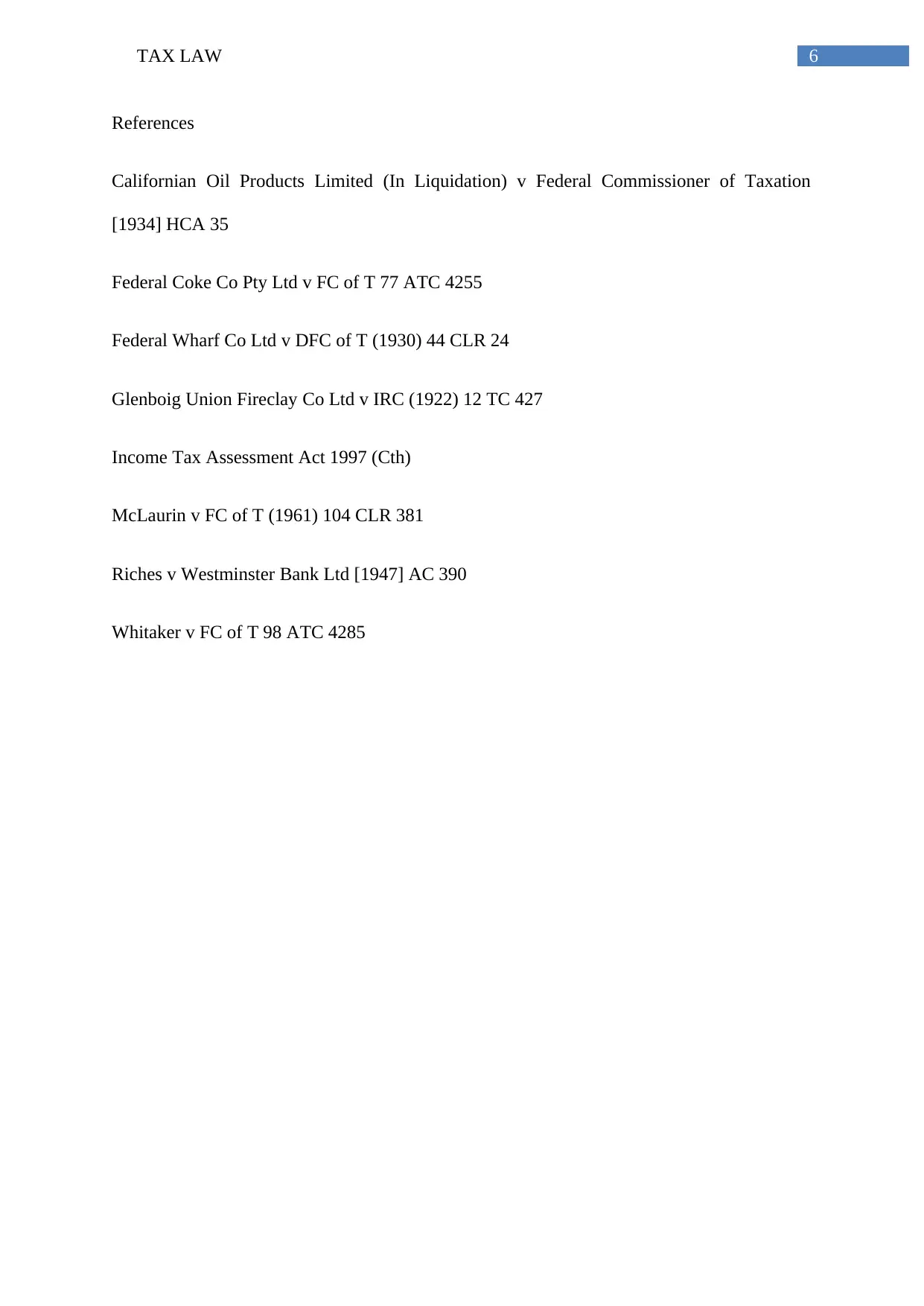
6TAX LAW
References
Californian Oil Products Limited (In Liquidation) v Federal Commissioner of Taxation
[1934] HCA 35
Federal Coke Co Pty Ltd v FC of T 77 ATC 4255
Federal Wharf Co Ltd v DFC of T (1930) 44 CLR 24
Glenboig Union Fireclay Co Ltd v IRC (1922) 12 TC 427
Income Tax Assessment Act 1997 (Cth)
McLaurin v FC of T (1961) 104 CLR 381
Riches v Westminster Bank Ltd [1947] AC 390
Whitaker v FC of T 98 ATC 4285
References
Californian Oil Products Limited (In Liquidation) v Federal Commissioner of Taxation
[1934] HCA 35
Federal Coke Co Pty Ltd v FC of T 77 ATC 4255
Federal Wharf Co Ltd v DFC of T (1930) 44 CLR 24
Glenboig Union Fireclay Co Ltd v IRC (1922) 12 TC 427
Income Tax Assessment Act 1997 (Cth)
McLaurin v FC of T (1961) 104 CLR 381
Riches v Westminster Bank Ltd [1947] AC 390
Whitaker v FC of T 98 ATC 4285
1 out of 7
Related Documents
Your All-in-One AI-Powered Toolkit for Academic Success.
+13062052269
info@desklib.com
Available 24*7 on WhatsApp / Email
![[object Object]](/_next/static/media/star-bottom.7253800d.svg)
Unlock your academic potential
Copyright © 2020–2026 A2Z Services. All Rights Reserved. Developed and managed by ZUCOL.




